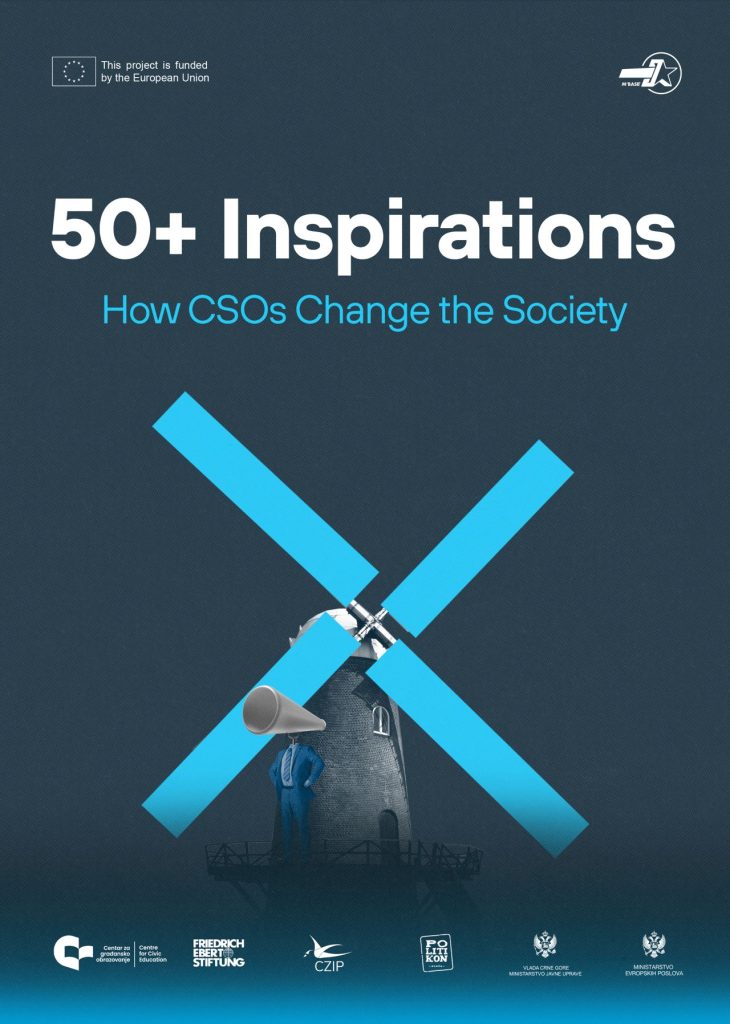How does civil society change lives, contribute to better decision-making processes, improve the functioning of institutions, or help preserve nature? Answers to these and many related questions can be found in the publication “50+ Inspirations – How CSOs Change the Society”, published by the Centre for Civic Education (CCE) as part of the M’BASE programme, providing an overview of over 50 success stories from CSOs across Montenegro, whose projects have had a direct and positive impact on local communities and beyond.
Through the M’BASE programme a total of 91 projects have been supported, strengthening the capacities of non-governmental organizations while improving the position of various target groups. This publication aims to further inspire and empower civil society organisations (CSOs), encourage greater civic engagement, and provide a foundation for sustainable and partnership-based collaboration between CSOs, institutions, and international partners.
Within their projects, CSOs have managed to strengthen local communities by improving public services and introducing good governance practices. They have also improved the conditions for marginalized groups, such as persons with disabilities, LGBTIQ individuals, minority communities, or youth at risk of social exclusion. Additionally, a significant number of projects focused on protecting natural resources and promoting sustainable development through activities aimed at preserving Montenegro’s rivers, forests, and biodiversity. One of the key components of these initiatives involved raising awareness of human rights and building the capacity of local CSOs to more effectively combat discrimination and corruption, while the other projects contributed to greater institutional transparency and accountability by fostering dialogue between citizens and government and encouraging increased civic participation in decision-making and monitoring the work of local governments and national institutions. Moreover, some projects launched educational and economic programmes for women from vulnerable groups or empowered young people to advocate for their rights.
“The projects presented in this publication demonstrate how essential CSOs are in strengthening democratic values, protecting human rights, and improving the quality of life in Montenegro. This has been especially important in recent years, when it was necessary to maintain a sober and consistent approach to assessing the situation and intervening in a country undergoing turbulent changes,” highlights the publication’s authors.
“50+ Inspirations – How CSOs Change the Society” is not just a collection of successful initiatives, but also a reminder of how crucial collective action and solidarity are in addressing various societal challenges. Through these stories, we want to highlight the dedication of numerous organizations that have selflessly contributed and inspired others to take a more active role in tackling problems in their communities,” the authors further state.
CCE also emphasizes that this publication serves as a call to institutions and policymakers to invest in strengthening the civil sector systematically and fairly, recognizing it as an indispensable partner in Montenegro’s democratization and European integration processes. Each pointed example, though there were many more than could fit into this publication, underscores the importance of building a more inclusive, just, and sustainable society, as well as the responsibility of all to create even more of these stories in the future.
The publication was developed as part of the programme “CSOs in Montenegro – From Basic Services to Policy Shaping – M’BASE”, implemented by CCE, in partnership with the German Friedrich Ebert Stiftung (FES), the Centre for Bird Protection and Research of Montenegro (CZIP), and the NGO Politikon Network, in collaboration with the Ministry of Public Administration and the Ministry of European Affairs of the Government of Montenegro. The project was funded by the European Union and co-funded by the Ministry of Public Administration.
Ivana Matanović, Programme Associate

